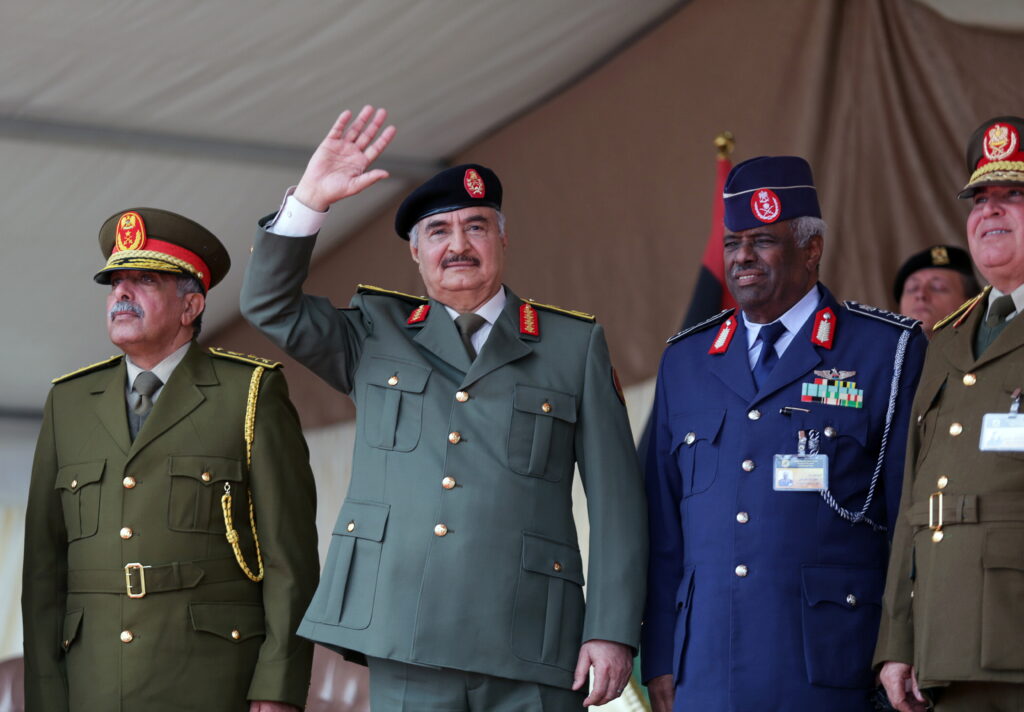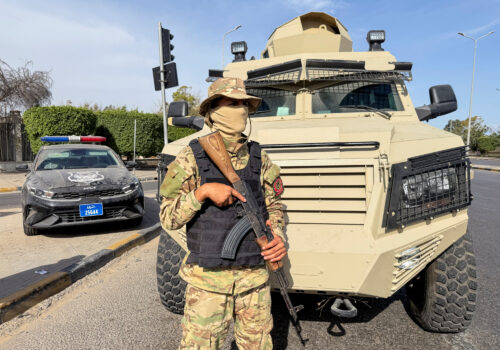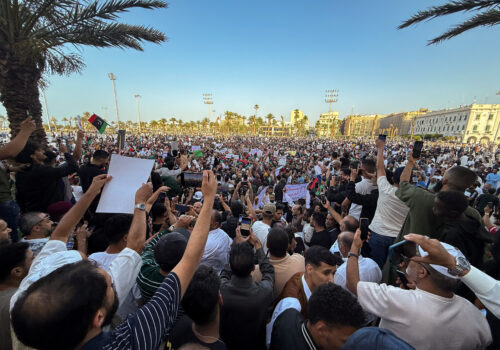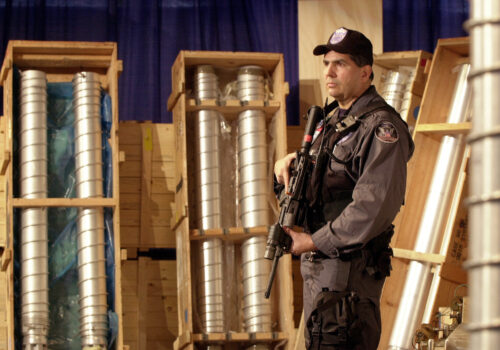On August 21, the United Nations Special Representative for Libya, Hanaa Tetteh, presented a new roadmap to the UN Security Council aimed at reviving the country’s stalled political process and offering a renewed prospect for stability after years of deadlock. The proposal comes at a time marked by widespread institutional distrust and growing public frustration, as Libyans grow weary of endless transitional phases that yield no tangible outcomes.
Against this backdrop, a significant political development unfolded in eastern Libya: General Khalifa Haftar recently appointed his son, Saddam Haftar, as Deputy General Commander of the Libyan National Army (LNA). He framed the move as part of the “General Commander’s Vision 2030” to modernize and enhance the military’s overall performance. Haftar also signaled that this was just the beginning of a broader restructuring involving appointments to “key positions.”
Soon after, the Libyan House of Representatives (HoR) unanimously approved Saddam Haftar’s promotion. The HoR also appointed Lieutenant General Abdelrazek Al-Nadouri as National Security Advisor, removing him from his post as Chief of Staff of the eastern forces. His replacement? Khaled Haftar, another of the general’s sons.
The fact that the appointment came just days before the UN announced its new roadmap aimed at guiding Libya toward elections and a unified government is, to say the least, notable. The developments also come amid a growing rapprochement between Haftar and Turkey, despite a history of tensions.
The developments may well set the stage for a potential power shift in Tripoli. Notably, they suggest that Haftar is not only shaping the current political landscape, but is also positioning himself—and his family—for long-term strategic influence.
The UN roadmap
The UN roadmap is structured around three central goals: establishing a credible electoral framework, forming a new unified national government, and launching an inclusive dialogue that engages not only political elites but also youth, women, civil society, and marginalized communities. The core idea is that only a genuinely inclusive process can ensure legitimacy and address the root causes of the conflict.
The proposed timeline spans twelve to eighteen months. It is intended to avoid the same gridlocks that derailed the 2021 elections, which were not held in the end, despite being the most significant task that the interim Government of National Unity (GNU) established as a result of a UN-led process, which was supposed to be carried out.
SIGN UP FOR THIS WEEK IN THE MIDEAST NEWSLETTER
Under this new plan, initial efforts will focus on strengthening the High National Electoral Commission, addressing leadership gaps, and resolving legal and political disputes that have obstructed voting over the past decade. Once these foundational steps are secured, attention will turn to forming a unified government responsible for guiding the country toward elections.
A significant element of the plan is its grounding in prior consultations conducted by the UN, which included input from over 22,000 Libyan citizens. A clear message emerged from these discussions: the need to restore political legitimacy through elections and move beyond institutions widely seen as ineffective and lacking credibility.
While “free and fair” elections are a cornerstone of any democratic system, in Libya’s current context, national elections—particularly in the short term—could risk exacerbating instability rather than resolving it. Though local elections were recently held, the event passed largely unnoticed. The UN marked it as a positive step, as the recorded turnout was considered significant (71 percent). Yet only twenty-six out of sixty-three municipalities participated, so the turnout concerned only the municipalities that actually voted. This underscores that popular enthusiasm for elections is far from universal, and that entrenching forces fighting for the maintenance of the status quo are still very powerful and capable of spoiling the electoral process. At the moment, Libya remains divided into two, competing governments: the Government of National Unity (GNU) in the West, which—as mentioned above—was supposed to be an interim executive whose main task was to prepare elections in 2021 but which has remained in office since, and the eastern, non-recognized government backed by the forces of Khalifa Haftar and the HoR, the Parliament elected in 2014 whose speaker is Aguila Saleh.
While acknowledging the need to work with existing power structures until new institutions are in place, Tetteh warned that the path forward will be fraught with resistance and potential attempts at sabotage. In light of these challenges, she urged members of the Security Council to remain united and resolute, emphasizing the importance of holding accountable those who obstruct progress. In her words, the roadmap represents “a real opportunity” to restore legitimacy and stability in Libya—an opportunity to end the cycle of perpetual transitions and lay the groundwork for state reconstruction after more than a decade of fragmentation.
Haftar’s power grab and Turkey’s emerging influence
All of Haftar’s sons now occupy senior positions in eastern Libya, both in military and economic spheres. Among them, Saddam is widely perceived as the heir apparent. His latest promotion cements his status within the family’s power structure, effectively positioning him as a crown prince and the most likely political and military successor to his father. The significance of this move is amplified by persistent speculation surrounding General Haftar’s advanced age and health.
Saddam’s elevation coincides with his increasingly visible international presence. In recent months, he has undertaken a series of high-level diplomatic visits on behalf of his father. In July, he traveled to Islamabad to meet with Pakistan’s army chief, General Asim Munir, and Prime Minister Shehbaz Sharif to discuss defense cooperation and naval relations. Earlier in the year, he visited Washington for meetings with US State Department officials; Rome, where he met with Italian Defense Minister Guido Crosetto; and Cairo, where he discussed military and security coordination with Egyptian Chief of Staff Ahmed Fathi Khalifa.
Perhaps the most notable visit was to Turkey, marking the first direct military engagement between the Haftar family and Ankara. In Istanbul, Saddam met with Turkish Defense Minister Yaşar Güler and Chief of Staff Selçuk Oğuz.
In a context marked by endemic fragmentation and deep political-institutional polarization, Saddam’s appointment was met with mixed reactions. As expected, the decision was welcomed by leaders in the eastern part of the country, many of whom remain closely—perhaps even literally—tied to General Haftar’s will. Conversely, it sparked concern and criticism among factions aligned with the Tripoli-based Government of National Unity (GNU).
Just days after the UN announcement, on August 25, General Haftar hosted Ibrahim Kalin, head of Turkey’s National Intelligence Organization (MIT), in Benghazi. Alongside Foreign Minister Hakan Fidan, Kalin is widely seen as one of President Erdoğan’s most powerful and trusted figures. His decision to visit Benghazi—without stopping in Tripoli—was highly symbolic. The day before, the Turkish Navy corvette TCG Kınalıada (F-514) docked in Benghazi, where it was received by Saddam Haftar. This marked the first visit by a Turkish warship to eastern Libya, a region firmly under Haftar’s control.
Also on August 25, Khaled Haftar met with US Chargé d’Affaires Jeremy Berndt, currently the highest-ranking American official in Libya following the end of Richard Norland’s term as Special Envoy this past May. Their meeting focused on the US–Libya security partnership. Berndt emphasized the importance of “unifying Libya’s military and security institutions and promoting long-term stability for the Libyan people,” adding that the United States “will continue to engage with security leaders across Libya.”
Our Libyan sources on the ground reported that on the same day, General Haftar also held meetings with representatives from Turkey, France, the United States, and Italy. This series of engagements further confirms the diplomatic momentum Haftar has cultivated in recent months, especially with respect to Turkey. The timing of both his “dynastic” appointments and these high-level diplomatic contacts together suggests Haftar’s aims of establishing a long-term hold on power for himself and his family.
For the current leadership in Tripoli, these developments present serious challenges. Prime Minister Abdelhamid Dbeibah of the Government of National Unity (GNU) has paradoxically seen his political space narrow since the killing of Abdel Ghani al-Kikli (known as “Ghaniwa”) in May. In the weeks following al-Kikli’s death, it became increasingly clear that the militias supposedly underpinning Dbeibah’s control over Tripoli and its surroundings are more autonomous—and less loyal—than previously assumed. In fact, the local militias determined the width of the clashes and their maximum profundity, halting the battle when more convenient for them.
At the same time, Turkey was operating another strategic turn by pursuing more decisively a rapprochement with its eastern Mediterranean main rival, Egypt. This brilliant diplomatic action clearly showed Ankara’s pragmatic approach in the Mediterranean towards old foes, although the road to full cooperation with Cairo is still bumpy.
After years of tension, sparked by the ousting of President Mohammed Morsi in 2013 and the rise to power of General Abdel Fattah el-Sisi, bilateral political and diplomatic strains had long limited Ankara and Cairo’s collaboration on regional crises across Africa and the Eastern Mediterranean, with Libya being an obvious case in point. However, as a result of the war in Gaza, Turkey and Egypt began working to end a decade of hostility, opening the gates for cooperation on new strategies to tackle enduring crises. Even so, regional rivalries, conflicting loyalties, and the role of other external actors still complicate cooperation.
In Libya, it is becoming evident that, rather than aligning with specific actors, Turkey appears focused on outcomes: securing acceptance of the Memorandum of Understanding (MoU) on the Exclusive Economic Zone, winning contracts for Libya’s reconstruction, and leveraging Libya as a strategic counterweight to Greek-Cypriot-French efforts to isolate Turkey in the Eastern Mediterranean. The MoU is Turkey’s most significant interest in Libya. If both governments in Libya agree on that, this would be Turkey’s best guarantee against any attempts from regional rivals to isolate it and undermine its interests in energy exploration. Indeed, this MoU was crucial for Ankara’s military intervention in November 2019, as it happened only after the then Government of the National Accord (GNA) signed this MoU in return for Turkey’s military assistance against Haftar’s forces.
In the short term, Turkey will likely encourage both Libya’s western and eastern factions to reach a compromise and form a power-sharing government. However, from a longer-term perspective, the outlook for Dbeibah appears significantly less favorable.
With the decisions made in recent days, Haftar has cemented dynastic control over the eastern forces, making it clear that he and his family dominate the security apparatus in Cyrenaica. Dbeibah, by contrast, cannot claim the same level of control in the west, as he remains dependent on the support of Tripolitania militias—rather than commanding them. Actually, even more correct would be to say that his power position depends in good part on the goodwill of the militias, but mostly thanks to the Turkish army stationed in the western territory. Not really a popular endorsement or a clear-cut legitimacy.
In this context, once the probable power-sharing arrangement brings Haftar and his allies in Tripoli, his firm grip on the eastern forces could be used to assert control over the capital, as well. Whether that control is achieved through negotiation or coercion will depend on the response of militias in Tripoli and Misrata—and on the interests of key external actors, particularly Turkey, in that evolving scenario.
Turkey likely remains the only actor capable of setting real limits on Haftar’s ambitions. Yet, as recent developments demonstrate, Ankara has shown a willingness to engage with eastern factions—particularly after Haftar and his inner circle began aligning more closely with Turkish strategic interests. After his failed blitzkrieg on Tripoli in 2019/2020–repelled only by decisive Turkish military intervention—Haftar may now find himself entering the capital not through force, but through diplomacy. In a striking reversal, he could walk into Tripoli triumphantly—without firing a shot—thanks to this unexpected convergence with Ankara.
Karim Mezran is the director of the North Africa Initiative and a resident senior fellow with the Rafik Hariri Center and Middle East Programs at the Atlantic Council, focusing on the processes of change in North Africa.
Dario Cristiani is a political risk consultant and an associate fellow at the Istituto Affari Internazionali global actors program in Rome. He is also a senior fellow at the German Marshall Fund, working on Italian foreign policy, the Mediterranean, and global politics.
Further reading
Fri, May 16, 2025
The killing of Abdul Ghani al-Kikli may be a turning point for Libya
MENASource By
The killing is considered to be part of a push to eliminate influential militia leaders and consolidate GNU loyalist control over Tripoli.
Tue, May 27, 2025
Beyond ceasefires: Reimagining stability and engagement in Libya
MENASource By
With all major political institutions mired in crisis, a renewed approach to peace enforcement is pivotal to building stability.
Wed, Apr 30, 2025
From Tripoli to Tehran: Lessons from Libya in US-Iran nuclear talks
MENASource By
Twenty-one years later, the nuclear disarmament of Libya serves as a model for the United States in current nuclear negotiations with Iran.
Image: Libyan military commander Khalifa Haftar waves during Independence Day celebrations in Benghazi, Libya December 24, 2020. REUTERS/Esam Omran Al-Fetori



